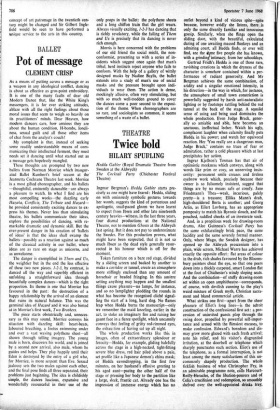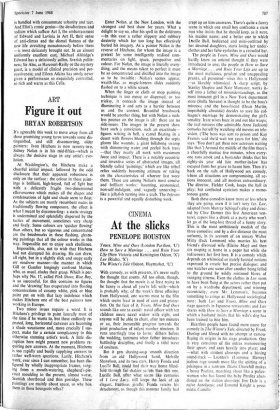THEATRE
Twice bold
HILARY SPUI?LING
The Cocktail Party (Chichester Festival Theatre) Ingmar Bergman's Hedda Gabler starts pre- cisely as one might have feared : Hedda, sliding on with ominously symbolic gestures towards her womb, suggests the kind of portentous and apologetic, snail-paced gloom we have learnt to expect from Ibsen and other late nineteenth century heavies—witness, in the last three years, four dismal productions at the National Theatre, not to mention Ghosts at the Aldwych last spring. But it does not pay to underestimate the Swedes. For this production proves, what might have been suspected, that it is not so much Ibsen as the dead style generally resur- rected in his honour which is off for the moment.
Token furniture on a bare red stage, divided by a sliding screen and backed by another to make a corridor or tunnel, create an atmosphere more stiflingly enclosed than any amount of horsehair or beaded fringing. In this austere setting anything may happen and the smallest things cause pleasure—no lamps, for instance, and so no lamplighter plodding the rounds in what has become the recognised cliche signal- ling the start of a long, hard slog. No flames leap when Hedda burns the manuscript—only we remember the maid kneeling, earlier in the act, to stoke an imaginary fire and raising her gaunt face in a fierce spotlight, which uncannily conveys that feeling of gritty red-rimmed eyes, the exhaustion of having sat up all night.
The whole production works like this in images, often of extraordinary splendour or ferocity—Hedda, for example, gliding balefully across the stage in a high-necked, tight-fitting severe blue dress, red hair piled above a pale, set profile like a Japanese demon's china mask; or Hedda eavesdropping, in the first few minutes, on her husband's effusive greeting to his aged aunt—pacing the other half of the stage or pressing her body to the partition like a large, sleek, frantic cat. Already one has the impression of immense energy which has no outlet beyond a kind of vicious spite—spite because, however avidly she listens, there is only the same drearily familiar and innocuous gossip. Similarly, when she flings open the sliding door, with the beautiful, calculated daring of one awaiting massed flunkeys and an admiring court, all Hedda finds, or ever will find, are the ,me five people she has known, with a grinding'intimacy, from her schooldays.
Gertrud Fridh's Hedda is one of those rare, ravishing creations in which the dryness of the character is somehow contained within a per- formance of radiant generosity. And Mr Bergman achieves the same combination, of aridity and a singular emotional intensity, in his direction—in the way in which, for instance, the atmosphere of small town constriction is powerfully suggested by harsh anti-naturalistic lighting or by footsteps rattling behind the red tunnel at the back of the stage. A squalid sense of using and being used dominates the whole production. Even Judge Brack, gener- ally so amiable and able, here becomes an unctuous, ineffectual lecher. Watch his ugly, complacent laughter when calamity finally puts Hedda in his power; and watch her equivocal reaction. Her 'You really are a dangerous man, Judge Brack,' contains no trace of fear or admiration, rather a cold pleasure which at last precipitates her action.
Ingvar Kjellson's Tesman has that air of optimistic meekness which conveys, along with words like prim or cosy, an unnerving insin- cerity: permanent smile creases and tireless eyebrow work which, precisely because their owner is so fulsomely insistent, suggest that things are by no means safe or comfy. Jane Friedmann's Thea—weak, incurious, palely pretty—is a treasure; Ellika Mann's drab, high-shouldered Berta is another; and Georg Arlin, as Eilert Lovborg, has an appropriate pomposity to match his Byronic slouch, and the pouched, raddled cheeks of an inveterate soak.
And, in a propitious week for drawing-room drama, Alec Guinness's Cocktail Party has the same exhilaratingly brisk pace, the same lucidity and the same severely formal manner. Only, where Mago, the Swedish designer, has opened up the Aldwych proscenium into a plain, wide screen, Michael Warre has achieved exactly the opposite effect: flat areas of colour in the drab, rich shades favoured by the Blooms- bury painters cheat the eye, so that one peers down into a thickly carpeted, smart London flat at the foot of Chichester's windy sloping seats. And the combination—of stuffy drawing-room set within an open amphitheatre—corresponds, of course, with devilish cunning to the play's weird mixture of Greek myth, Christian sacra- ment and bland commercial article.
What strikes one first—apart from the sheer pleasure of Eliot's long lines—is the adroit construction of the confessional first act: a pro- cession of uninvited guests plop through the swing door, propelled by powerful self-impor- tance and armed with the flimsiest excuses, to make confession. Edward's boredom and dis- may grow more glazed with each fresh arrival; note his relief, and his visitor's disgruntled irritation, at the doorbell or telephone which sharply punctuates each section. Eliot's use of the telephone, as a formal interruption, is not least among the many satisfactions of this un- commonly shapely production. The whole ticklish business of what Christopher Fry, in an admirable programme note, calls Harcourt- Reilly-Heracles, of the libation-pourers and of Celia's crucifixion and redemption, so smoothly shelved over the well-appointed drinks tray, is handled with consummate urbanity and tact. And Eliot's comic genius—the desultoriness and tedium which suffuse Act I, the embarrassment of Edward and Lavinia in Act H, their sense of anti-climax and the dismal flatness of the new life stretching monotonously before them —is most delicately brought out. In an almost uniformly excellent cast, Michael Aldridge's Edward has a deliciously sullen, liverish polite- ness; Sir Alec, as Harcourt-Reilly or the mystery guest, is a model of clinical precision and per- suasiveness; and Eileen Atkins has surely never given a performance so exquisitely controlled, so rich and warm as this Celia.







































 Previous page
Previous page